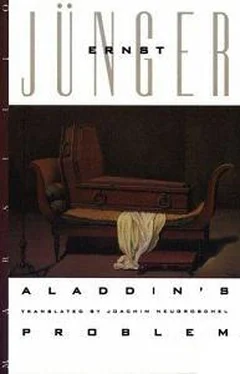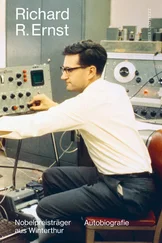So I put my papers in order, took along my documents, and asked for political asylum in the West. All I had to do was cross the street.
28
All things considered, this was no easy step for me — and not only because ofJagello. After all, I was breaking off a good career. I won't go along with phrases like "more freedom." I am no liberal — at least not in the sense that people have to get together and vote on the matter. One carries freedom inside oneself; a man with a good mind will realize his potential in any regime. Once his good mind is recognized, he will advance anywhere, cross any line. He does not pass through the regimes, they pass through him, barely leaving a trace. He can do without them, but they cannot do without him. If they are strict, it hones his intelligence. Besides, the regimes are visibly growing alike; good cheer is vanishing everywhere, even the sourire is vanishing in Paris.
29
So much for my background. I would like to conclude with an anecdote I heard from one of my ancestors; he had witnessed the event. Steinmetz, the Prussian marshal, the victor at Nachod and Skalitz, became intransigent, indeed almost peculiar in his old age, like many generals who have served honorably. At times, Blucher thought the old man had an elephant in his head. In 187o, when Steinmetz was put in charge of the First Army, Waldersee said that the old man was already three-quarters crazy. And in fact, he ordered some bizarre maneuvers and was then put second-in-command to Prince Friedrich Karl. Naturally, Steinmetz was deeply offended.
When the marshal was holding a conference after Gravelotte, the prince and his retinue rode by at a certain distance. Steinmetz took no notice. Friedrich Karl sent an aide-de-camp to the marshal, asking him to report. The obstinate old man refused. With a heavy heart, the king then relieved him of his command and appointed him governor of Silesia.
Those are old stories; Steinmetz is no longer even mentioned in the encyclopedia. I have brought him up because the Prussians are surviving more strongly in the East than in the West — not in the tradition, of course, but in the style. Jagello was a good example. That explains why, when I picked up my papers in Liegnitz, I could imitate the prince — albeit only en miniature, but with success — and in the East German People's Army at that.
It occurred before my transfer to Berlin. Coming out of the barracks in my new uniform, I saw Stellmann on the square, he was operating at full capacity. Saluting me casually, he turned back to the troops. He was not to get away with that. I strode over to him:
"Don't you know you're supposed to identify yourself, Sergeant?"
He gaped at me and grew even paler, a chalky white. Then he pulled himself together. "Second Company, rifle inspection, sir."
"Thank you, carry on." That was my final encounter with him.
30
My problem is not in my profession. I have certainly had my share of trouble here, like anyone else. At first, I was even a washout; but I developed into what is known as a climber. The pattern of my military career was repeated in business. On the whole, it seems to me that we follow the same law in every segment of our lives. Plainly, our makeup is not only linear, but also cyclical. Neither excludes the other. A tire rolls across asphalt.
My desertion made headlines; I had foreseen this. Now I could have gone on with my career in a different context; offers came for secret services. I had a list of Eastern agents inside my head, but I made no use of it. Betrayal of whoever it might be is not my thing; Jagello had likewise not expected it of me. He could put his mind at ease. Anything written in a newspaper is soon forgotten, thank goodness, but it remains in the registers and may eventually resurface.
I was unemployed now and almost penniless. It was, as they say, too little to live on, too much to die with. Initially, I had a small subsidy, my relatives could contribute a little. They opened their front doors themselves now, and they did not look pleased when I knocked. I did a lot of walking and got to know the mood of someone who wonders whether or not he can afford to have his shoes resoled.
What does one do in this situation today? One smokes opium or goes to the university. I opted for the university after weeks of spending most of my time in bed. I went out only to go to the library, from which I returned laden with books.
I had old-fashioned notions about Alma Mater and the professors. Soon I realized that I could get nothing out of them. I often felt as if eunuchs were tussling with hermaphrodites. Schizophrenia was trumps. The natural sciences were encoded, history and the humanities politicized. The theologians were still lagging behind Darwin or even Copernicus and, swinging their train-oil lamps, they actually plumed themselves on their boldness. Pedagogical eros was lacking altogether; it was replaced by a kind of complicity. Where were the times when an electrical aura emanated the instant the professor appeared?
I would never have dreamed that I would long for the barracks; but even when Stellmann was yelling at us, there was still a demonic atmosphere. Not only Konigsberg was a ruin, but also Heidelberg, Tubingen, Gottingen. They were still dominated physically, spiritually, and morally by the gray factory-style of the nineteenth century, whether one entered a laboratory, a school, or a hospital. Plus the nightmarish sense that this could only be a thin skin with something monstrous hatching underneath.
I lacked a friend to share my sorrows and yearnings, someone to converse with. I missed Jagello; though we lived in the same city, we were further apart than antipodes.
31
But what good did it do? Our farmers say that you can't ask an ox for more than a piece of beef. So I focused on what was offered, and the subjects I chose were advertising, statistics, computer technology, insurance, journalism.
My situation improved considerably when I married Bertha. We had met in the student restaurant. At first, our relationship seemed casual, but soon it deepened. Bertha was not only a good lover physically and mentally, but also a reliable companion. Being both cultured and practical, she knew how to give our life a framework in which we felt good. Granted, she had to break off her studies — classical languages. Nevertheless, they came in handy: she compiled the catalogues in a second-hand bookshop; however, she also had to help out in the store and at the cash register.
We kept to ourselves in one ofthe many-storied apartment houses, as if in a cell; we had no friends and only the unavoidable acquaintances. We could call ourselves happy, aside from the fact that Bertha was usually quite exhausted when she returned from the bookshop. This profession too calculates more with machines than with the mind; nevertheless, the work is more draining than it used to be — that is how we are hoodwinked by the machine world.
I often felt sorry for her when I saw her in the evening, as she pulled herself together at the table. I had done the shopping, no cans, and had prepared the meal, except for the spices; plus a glass of wine. These are happy hours; we relish our own delight in the other's delight.
We had the weekends, and then vacations: Mallorca, Sicily, Tunisia. Above all, my studies were gradually coming to an end, and I hoped I would soon find a profession.
32
And indeed I did, although I began with a modest, perhaps even slightly disreputable job. Let me fill in the background.
I remember my grandfather as a small, wiry man. He was also my godfather; I was named Friedrich after him. He went straight from the Liegnitz Barracks into the first of the great wars, fighting until the end — initially at the front lines, then on Mackensen's staff. He liked talking about the Rumanian campaign; those were still operations in the old style. He extended the war after the Treaty of Versailles by joining a Free Corps and distinguishing himself in a skirmish — at Annaberg, I believe.
Читать дальше












